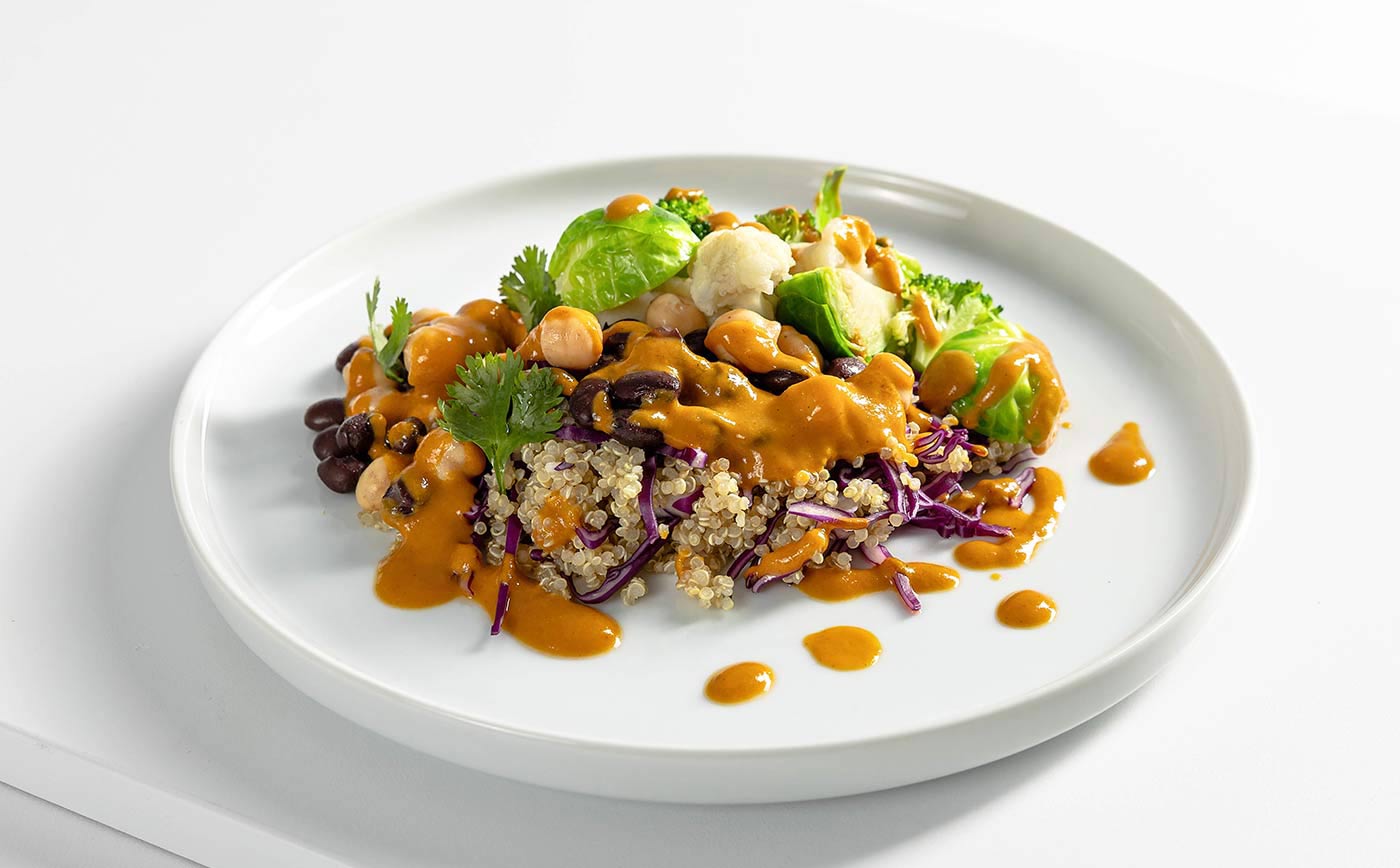If you are an athlete and have thought about how to improve your performance, it is likely you have seen the smash hit Netflix documentary “Game Changers”. With top athletes around the world in various sports switching to a plant based diet, you have to ask yourself, what is it about this diet that I need to know. In this article Dr. Marcela Sandoval breaks down everything you need to know including impacts of a vegan diet on athletes, plant based diet meal plans, and potential and perceived deficiencies, and how to setup your meal plans.
What is a Plant-Based Diet?
First of all, it is important to know the difference between the terms “vegan” and “plant-based.”
Veganism, according to the Vegan Society, is a way of living that seeks to exclude, as far as is possible and practical, all forms of exploitation of, and cruelty to, animals for food, clothing or any other purpose.
A plant-based diet fits in the feeding definition of veganism, but has nothing to do with clothing or the use of animals in make-up or soaps, for instance. It is important to highlight that a plant-based diet is not the same as “not eating animals” because, in that case, having a soda and French fries would be part of the concept but not part of the solution in seeking health, reversal of disease, energy, or sport-endurance improvement, among other goals.
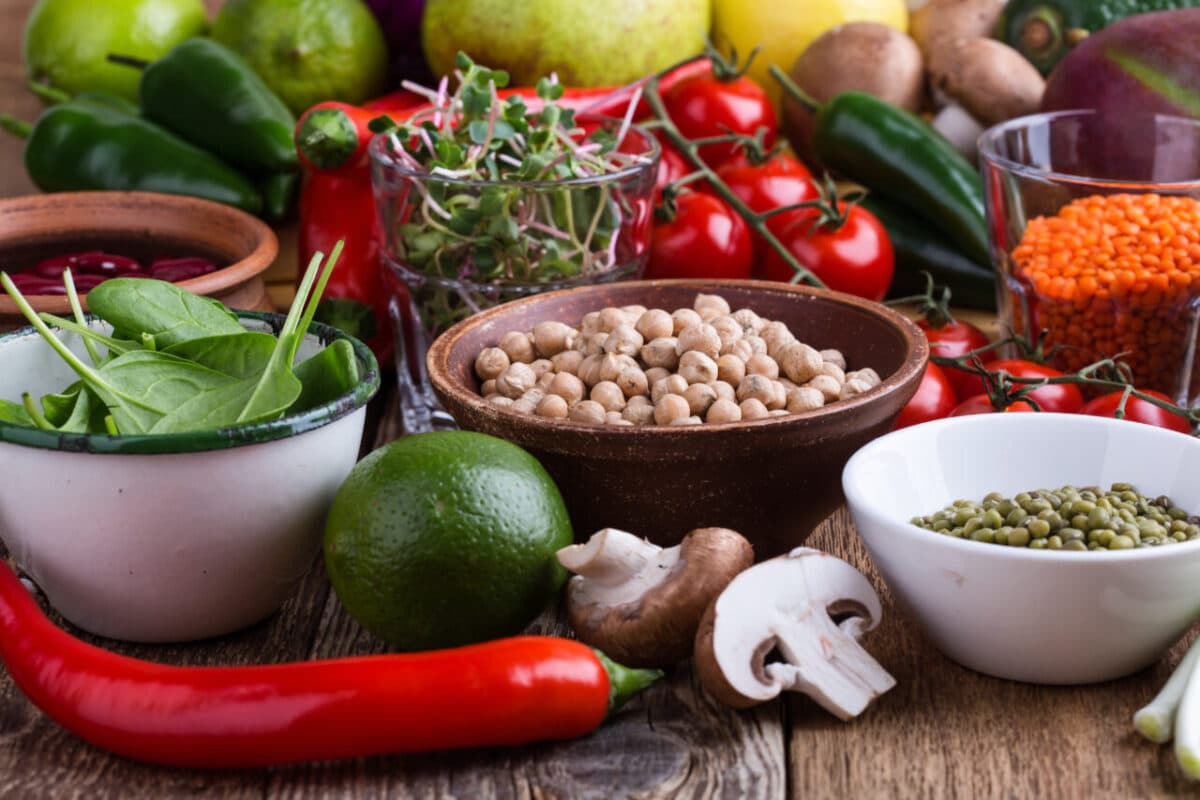
A whole-food, plant-based diet (WFPBD) encourages plant foods in their whole form: fruits, vegetables, sprouts, roots, legumes, grains, nuts, and seeds.
Nonetheless, the terms “vegan diet” and “whole-food, plant-based diet” have been used indistinctly in different medical and non-medical publications.
Think of it as gasoline for the car. If you introduce another type of liquid, but not gasoline, to your car, it will not work. It is that simple. Soda instead of gasoline? There is fuel that has been specifically designed for a specialized machinery that is called a car. Or even better, there is specialized machinery called a car that has been perfectly designed to work with a specific fuel named gasoline.
So, there are specific foods perfectly designed to nourish the advanced, living machinery called the human body. Once this fuel or these specific foods enter the body, the body is capable of returning to its natural form of being, with the exact amount of fat and weight the body needs, no disease, outstanding energy levels, a clear mind, happiness and, you name it. The human body reverts to its natural state of being.
Professional Athletes on Plant-Based Diets
Formula One driver Lewis Hamilton, a six-time world champion
Hamilton has been following a plant-based diet since 2017. He had loved meat, until he realized the cruelty that came along with processing animal products; he decided to stop contributing to that cruelty. He also began to study more about the benefits of a plant-based diet so he could be the best athlete he could be.
What did he get after changing his diet? Hamilton said his skin cleared up, his energy levels shot up, his asthma went into remission (perhaps even reversion), and he had no more bloating or any other gut issue.
Now, he said, diet is an important asset in terms of refueling his body, not only eating for pleasure. “Every person I have met who has gone vegan,” Hamilton said, “says it is the best decision they have ever made.”
Tennis champion Venus Williams, former No. 1 tennis player in the world
Williams was diagnosed with Sjögren’s syndrome back in 2011 but her symptom had begun as early as 2004. Sjögren’s is an auto-immune disorder characterized by dry eyes and dry mouth. People with the disease may also present fatigue and joint pain.
To treat the syndrome, Williams went on a plant-based diet after recommendations from her doctor to do so.

Venus Williams switched to plant based diet since 2012
The new diet, she said, makes her full of energy and saved her career, since the disease was threatening it. “I eat to live, not live to eat,” Williams said.
NFL’s Tennessee Titan Derrick Morgan, former linebacker
“I used to believe athletes had to eat meat to maintain play, then I educated myself,” said Morgan, who adopted a plant-based diet to improve his athletic performance with the help of his wife, vegan chef Charity Morgan. Charity has 15 years of experience and a culinary degree from Le Cordon Bleu College of Culinary Arts.
The couple inspired 14 other Titans once they realized Derrick “did not die in the field” and that his stats did not go down while on the new diet. On the contrary, in talking about her new plant-based diet recruits, Charity Morgan said, “Once they realized they could have lasagna, enchiladas, and mac-and-cheese in plant-based form, they were so stoked.”
Can a Vegan Diet Affect Performance?
The American Dietetic Association (ADA) in 2009 published its position with regard to vegetarian diets and it has not changed its missive since. The ADA stated that “appropriately planned vegetarian, including vegan, diets are healthful, nutritionally adequate, and may provide health benefits for the prevention and treatment of certain diseases. These diets are appropriate for all stages of the life cycle, including pregnancy, lactation, infancy, childhood, adolescence, older adulthood, and for athletes.”
It is important to note that one of the main characteristics of the vegan or plant-based diet to be appropriate for a human being is that it MUST be well-planned. What type of diet must not be well-planned? None.
Read More: Best Vegan Meal Delivery Services – 2021 Review
The food we eat should always meet the requirements our body has every single day. Omnivore and herbivore diets must include every single micro and macro nutrient the human body needs.
Vegan Meal Delivery Service By Trifecta Nutrition
New home delivery meal service options are popping up all the time. Trifecta Nutrition, a sponsor of the CrossFit games is gaining popularity with athletes and regular people across America because of the wide range of “done for you” healthy diet options they offer.
They prioritize macronutrients and balanced meals, which helps keep their clients fueled for tough workouts.
Check out our detailed review of Trifecta Nutrition here.
In 2016, the Academy of Nutrition and Dietetics, Dietitians of Canada, and the American College of Sports Medicine determined that “the performance of, and recovery from, sporting activities are enhanced by well-chosen nutrition strategies.”
Consider the following:
- Processed grains (e.g., flour) and sugar have a high glycemic index and increase insulin production, leading to pre-diabetic or diabetic states.
- Processed meats, including sausage, bacon, lunch meat, cured meats, jerky, ham and hot dogs (e.g., any meat that has been salted, smoked, fermented, cured or processed in another way), are on the list of carcinogenic food sources for humans, specifically for colon cancer, stomach cancer, pancreatic cancer and prostate cancer, according to the American Cancer Society.
- Red meat (e.g., beef, pork, lamb, and goat) are probable carcinogens associated with colorectal cancer.
- Harmful fats can be found in lard, butter, meat, dairy, and tropical oils.
Athletes’ tissues must be “exhausted” if fed those types of animal products. Pain, inflammatory states, delays in recovery time after injuries, different types of diseases and low energy are just some complaints athletes face on their way to championships following diets of these types of “foods.”

Once we recognize the specific effects of everything that has been known as “food” but, on the contrary, is not food, we become aware of the benefits real food from nature can do for our health and our well-being overall.
Many scientific papers have shown that a WFPBD can change your genes to lower the overall risk of chronic disease, treat chronic disease, and, perhaps, even reverse disease – one of the main reasons Venus Williams made the choice she made.
Additionally, this diet lowers total caloric intake, reduces feelings of hunger that result from weight loss, and normalizes hormones related to obesity. That is why any athlete looking for some wise weight loss can have results changing to a plant-based diet.
Read Also: Intermittent Fasting – The End All, Be All Guide For Beginners
Furthermore, consuming plants lowers inflammation through the addition of antioxidant foods and the reduced intake of pro-inflammatory foods (e.g., animal products and processed foods). There is no wonder why injury recovery is a natural, effective, and fast process in humans consuming plants, the type of athletic recovery Derrick Morgan was looking for.
What about changing to a plant-based diet for other reasons besides health, as did Lewis Hamilton? The Food and Agriculture Organization (FAO) of the United Nations, in its 2019 paper named “Sustainable Healthy Diets. Guiding Principles,” makes it clear that the evidence in regard to an environmentally friendly diet points out to be plant-based, including one of vegetables and fruits, nuts, pulses and whole grains.
As more and more athletes are switching to plant based diets, there are new products becoming available to help support this type of diet. Being an athlete is already a big time commitment, so supplements like Athletic Greens are making it easier to achieve the goal of focusing on athletic time commitments and also on making sure that the nutrients are coming from plant based sources. Athletic Greens review by Vegan Liftz breaks down the nutrition facts and the value for Athletes in more detail.
Also in 2019, Dr. Neal Barnard*, an American plant-based guru, along with some colleagues, published in the journal Nutrients a review about some reasons athletes were running toward a vegan diet. They cited that a vegan diet definitely and positively affects athletes’ and everyone’s physical performance. To name a few ways:
- Protection for the heart and blood vessels, including a reversal of coronary plaques, reduction of blood pressure, and improvement of tissue oxygenation;
- Reduction in body fat to a leaner composition;
- Reduction in body weight;
- Effective carbohydrate load because plants are typically high in carbs;
- Reduction in oxidative stress because fruits and vegetables are high in anti-oxidants; and
- Reduction in indicators of inflammation.
Given these benefits, there is no question as to why athletes might open their minds up to changing their ways of eating and, as a result, their way of living.
* Dr. Neal Barnard has a free e-book titled Food Power for Athletes, available at https://www.pcrm.org/news/blog/six-reasons-athletes-are-running-toward-vegan-diet
Plant-Based Meal Plans Perfect for Athletes
When my new patients with non-vegan backgrounds ask for help in going into a whole-food, plant-based diet (WFPBD), among their worries are food flavor and variety. There is a myth that vegan people only eat salads, for example, or, as some people have named it, “cow’s food (grass).”
Read More: Review of planned meals for athletes delivered by Trifecta Nutrition
But fruits, vegetables, legumes, whole grains, nuts, and seeds build the complete nutritional profile for every athlete. High-quality proteins, healthy simple and complex carbohydrates, good fats, iron, selenium, zinc, magnesium, potassium, sodium, vitamins, and more can be adequate, sufficient, varied, and complete with a WFPBD.
Here are examples of what you can be eating as a WFPB athlete:
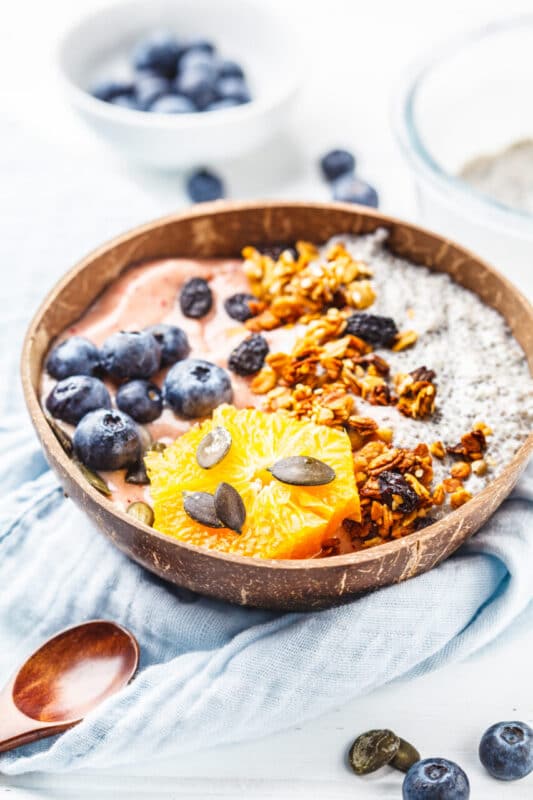
Vegan smoothie bowl with chia pudding, berries and granola.
Breakfast:
- Smoothies with at least a handful of green, leafy vegetables, fruits, and seeds
- Oatmeal with almond butter, chia, strawberries, and mangoes
- Smoothie bowls with flaxseeds, hemp hearts, cacao nibs, date syrup and seasonal fruits
- Tofu-yogurt with quinoa puffs, coconut flakes and sweet fruits
- Veggie tacos
Lunch/Dinner
- Scrambled tofu with nutritional yeast and turmeric
- Vegan chickpea “no tuna” salad sandwich
- Lentil, beets, oats, carrots, and zucchini burger patties
- Cauliflower rice sushi with Nori algae, tofu, cucumber, avocado, carrots, and mango
- Macaroni and cheese
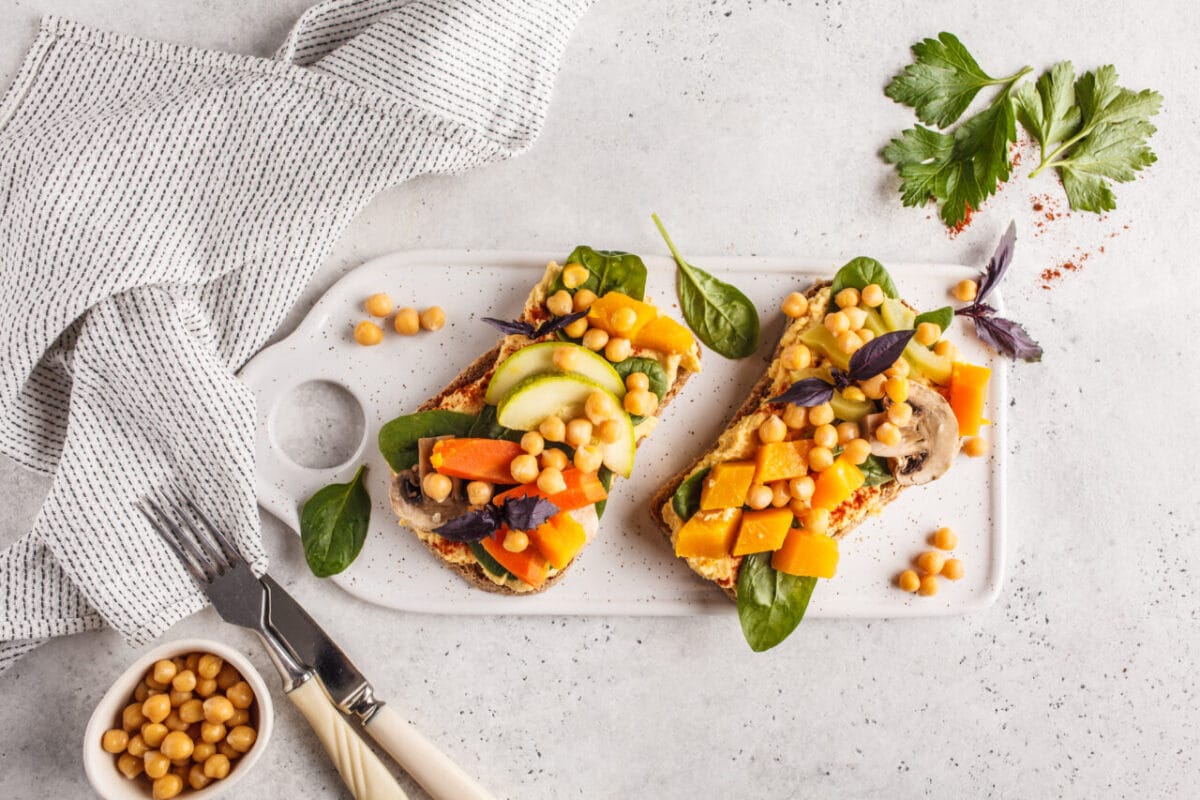
Vegan healthy sandwiches with hummus, chickpeas, baked vegetables and basil.

Snacks
- Watermelon and pistachios
- Strawberries and almond butter
- Blackberries and cashew butter
- Dates and a Brazil nut
- Hummus and carrots
Are you looking for meat substitutes? They’re easy to get by cooking different types of mushrooms, tofu, tempeh, eggplant, Jackfruit, oats, legumes, and even hibiscus and carrots!
Read Also: 6 Ways To Get Into Ketosis Quickly To Optimally Burn Fat
Want some delicious, nutritious, and addictive examples?
- Vegan hot dog with a special mix of sauces and seasonings
- All types of plant patties as burgers
- Chorizo
- Jackfruit bacon
- Tempeh stew
With a plant-based diet, everything can be satiated and completed: hunger, energy, health, flavor, cravings, muscles, and much more.
Potential and Perceived Deficiencies of a Plant-Based Diet
New patients with non-vegan backgrounds have other questions related to a whole-food, plant-based diet (WFPBD), mostly around what might be missing given what they view as dietary restrictions. Following are some of the common questions I am asked about the WFPBD.
What about proteins?
In the recent years or decades, protein, as a macro-nutrient, has often been related to animal products and powders. Proteins are formed by building-blocks called amino acids. We, as humans, can form some of them in our bodies but others must be consumed; those are called essential amino acids (it is essential to eat them). These originally come from plants and microbes, not animal products.
Even if plant foods do not contain all the essential amino acids, a strictly vegan diet can still provide a complete amino-acid profile by combining fruits and vegetables with an unprocessed starch. Since these three food groups (grains, fruits and veggies) are a must in a WFPBD, protein rarely needs to be prescribed.
Read Also: Best Keto Books To Grow Your Knowledge While Cutting Carbs
On the other hand, animal meat is not only protein. Most of the calories in animal foods are from saturated fat. Also, animal protein, even a few grams a day, has been tied to diabetes and different types of cancer, among other chronic diseases.
Do I have the risk to become anemic?
This question is a classic one in veganism and the answer is: it depends. First of all, anemia has many different causes, but the most common cause is due to iron deficiency. Remember that being vegan is not the same as being healthy in all cases. You can be consuming French fries and soda, as stated earlier, which means not eating animal products, and still be unhealthy.
Iron is a mineral that, in the human body, works by attaching to a protein called hemoglobin (I am fairly sure you have heard of it). Together, they hold oxygen molecules through the blood so oxygen can be delivered to every single tissue within the body. If iron is deficient in a diet, no oxygen can be delivered – a life-threatening situation. Iron must be consumed through diet and there are two different paths to get it, with pros and cons:
Heme iron
- Found in animal muscle and blood
- Pro: It is absorbed at a relatively constant rate of about 23%
- Con: High heme intake is associated with increased colorectal cancer risk.
Non-heme iron
- Found in animal products and plant foods
- Pro: Vitamin C is found in a wide variety of fruits and vegetables; therefore, following a whole-food, plant-based diet eliminates any concern related to non-heme iron absorption.
- Con: Its absorption rate varies depending on other dietary factors such as vitamin C consumption.
If omega-3 is only found in fish, how can I get it through a WFPBD?
There are three main omega-3 fatty acids: alpha linolenic acid (ALA), docosahexaenoic acid (DHA), and eicosapentaenoic acid (EPA). ALA is considered essential; it must be obtained from the diet and can be found in plants.
DHA and EPA are mainly obtained from cold-water fish but they are intermediaries. Cold-water fish are always trying to protect themselves from freezing; that is why they eat marine algae, which is rich in omega-3, a fatty acid that helps in thermal insulation.
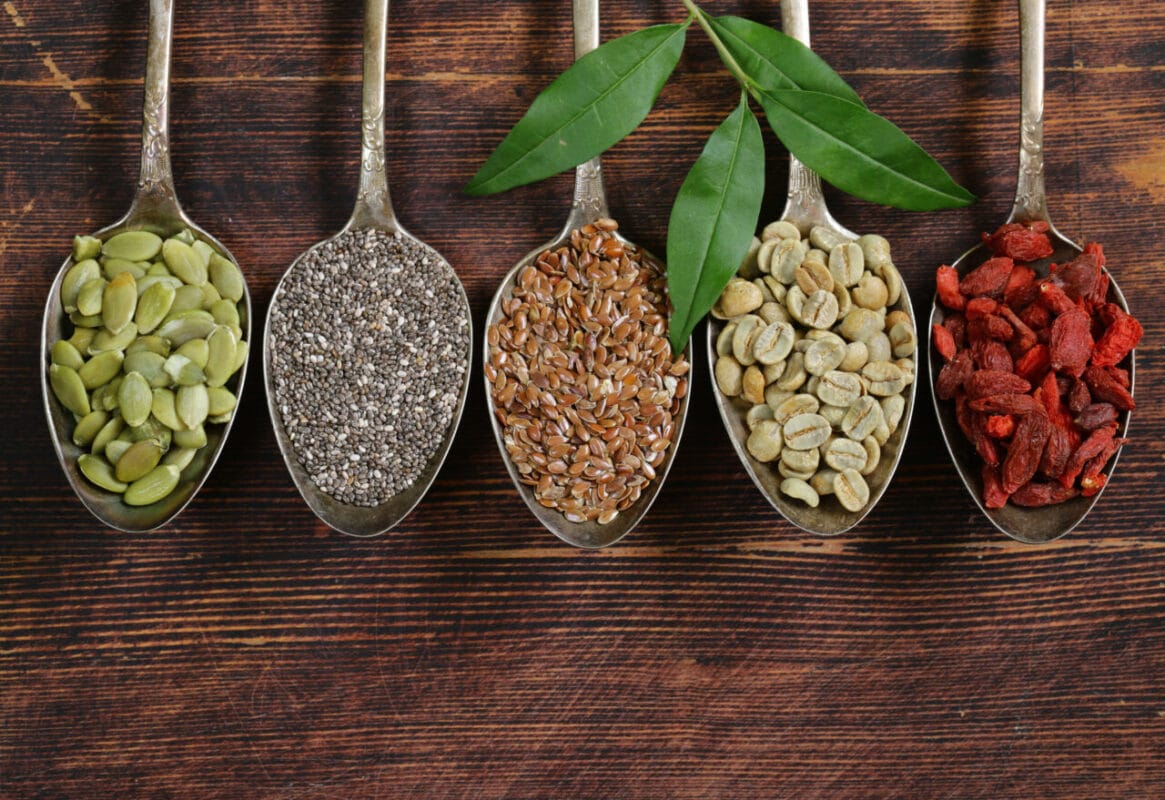
healthy eating ingredients super food – chia and flax seeds, goji berries, nuts
The human body can convert ALA to the other types of omega 3 fatty acids. Chia seeds, flaxseeds, hemp seeds and walnuts are the main sources of ALA.
What supplements do I need to complete my nutritional requirements?
I may say none, but I have to accept that vitamin B12 supplement is necessary. This vitamin is particularly important for our metabolism and nervous system, and the construction of red blood cells. It can be found in the bacteria in the soil.
Nowadays, it is especially important to wash fruits and vegetables in order to get rid of the soil to prevent diseases such as cholera. Therefore, we are not consuming our building blocks for vitamin B12 and a supplement is a must.
Animal products are a good source of vitamin B12 just because factory-farmed animals are fed with a supplement. Thus, this topic is relevant to both omnivore and herbivore types of diet.
Besides B12, a whole-food, plant-based diet is rich in every macro- and micro-nutrient our human bodies need.
Conclusion
If you have been considering switching to a plant based diet to improve your athletic performance, you probably are already on the right path in making good food choices and improving your quality of life. As you can see there is nothing stopping an athlete from making the switch to a healthier diet without meat except a better understanding of the foods you should eat to have a balanced diet. Start your journey by planning your meals and making it a habit. Before you will know it, you will be feeling great, and will never look back!


